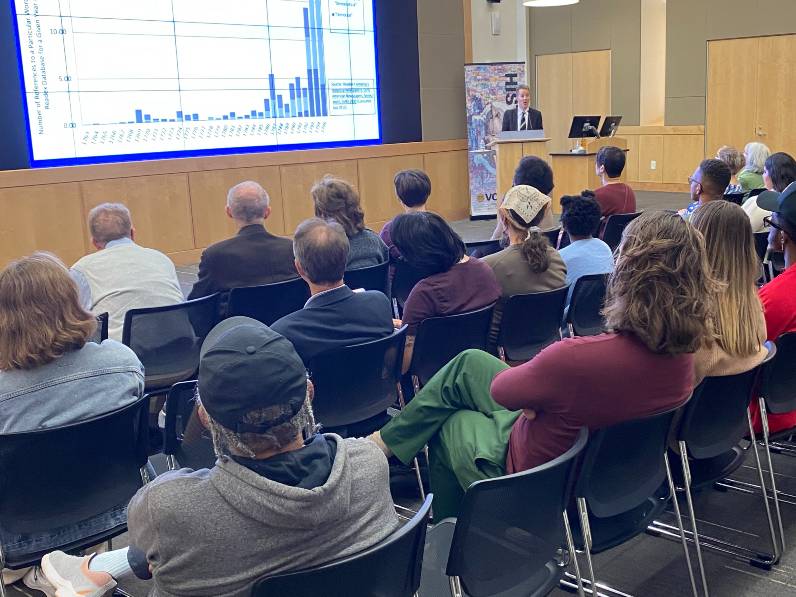Society of the Cincinnati Lecture Recap: The Revolutionary Invention of the American Democrat
Oct. 27, 2023

On October 17, Matthew Rainbow Hale, Ph.D. of Goucher College, presented the annual Society of the Cincinnati in the State of Virginia Lecture. This annual lecture, sponsored by the society, is a means to elevate historical literacy, especially as it pertains to America’s founding. Hale’s lecture focused on the remarkable new popularity of the word “democrat” in the United States during the 1790s.
Hale began by charting the use of the word “democrat” and related words, such as democracy or democratic, in historical American newspapers dated from 1763-1795, showing a spike in 1793. There really wasn’t much activity during the Revolution, surprisingly. The usage of the words slowly began in the late 1780s and surged in the 1790s. “What is striking is how infrequently democracy words were used in the years traditionally associated with the American Revolution,” he said.
Americans’ support for the French Revolution fostered this new self-identification as democrats, as the use of it was not a gradual evolution. Curiously, the explosion of democratic self-identification was linked to the idea that the American people were this nation’s sovereign, as opposed to European countries that had kings and queens.
The French Revolution provided Americans with an inspirational and impactful model of the people assuming and exercising its sovereignty. Americans’ widespread embrace of the idea of being democrats, Hale noted, was comparable to a religious conversion: a “miraculous overnight transformation from an old identity to a new one.” Most strikingly, he explained that many Americans embraced the monarchical connotations of the idea that their republic would be ruled by the American people. To be a democrat meant owning and embodying popular sovereignty with the self-aggrandizing arrogance and brilliance that kings and queens were known for. “To be a democrat was to declare oneself the new monarch on the block. In simpler terms, monarchy is the parent of democracy,” he told the assembled audience.
If Americans of the 1790s welcomed the royalist aspects of popular sovereignty, he also pointed to the ways that embrace of the term “democrat” also heralded new forms of equality. “Only by thinking of themselves as persons of exalted status did champions of the people acquire the regal bearing necessary to establish and enforce equality as the foundational doctrine of democratic self-rule.”
He quotes James Wilson, an associate justice of the Supreme Court from 1789-1798, “The supreme, absolute, and uncontrollable authority remains with the people…the supreme power resides in the PEOPLE, as the fountain of government.”
“The people were now the sovereign, not the king or queen,” Hale says. The American revolutionary struggle to institutionalize popular sovereignty resulted in a federal constitution, whose first three words, “We the People,” helped cement and popularize the idea of the people as the supreme or sovereign authority.
In concluding his remarks, Hale claims that “only by developing a historically nuanced understanding of the abrupt invention of the American Democrat can we break the spell of democracy, and see with fresh eyes our current political culture, its late 18th century founding, and the distinct albeit interrelated impacts of the American and French revolutions.”
The lecture gave modern Americans a deeper understanding into our current political climate, as well as the history of politics in America. The lecture was concise and very comprehensive.
VCU student and member of History Now! Emmett Angle-Davis commented, “Dr. Hale's lecture was very thought-provoking. I had never really thought too much about how the word 'democrat' is perceived in such a positive, morally virtuous way.”
Chan Williams, another VCU student also commented on Hale’s lecture stating, “It was fascinating to learn how the terms 'democrat' and 'citizen' helped form an American identity. Matthew Hale's lecture opened up a new perspective for understanding how and why the term 'democrat' holds so much weight for many Americans.”
VCU thanks Professor Matthew Rainbow Hale for his extensive research on such an enlightening topic.